Charles E W Bean, Diaries, AWM38 3DRL 606/276/1 - 1928-1937 - Part 17
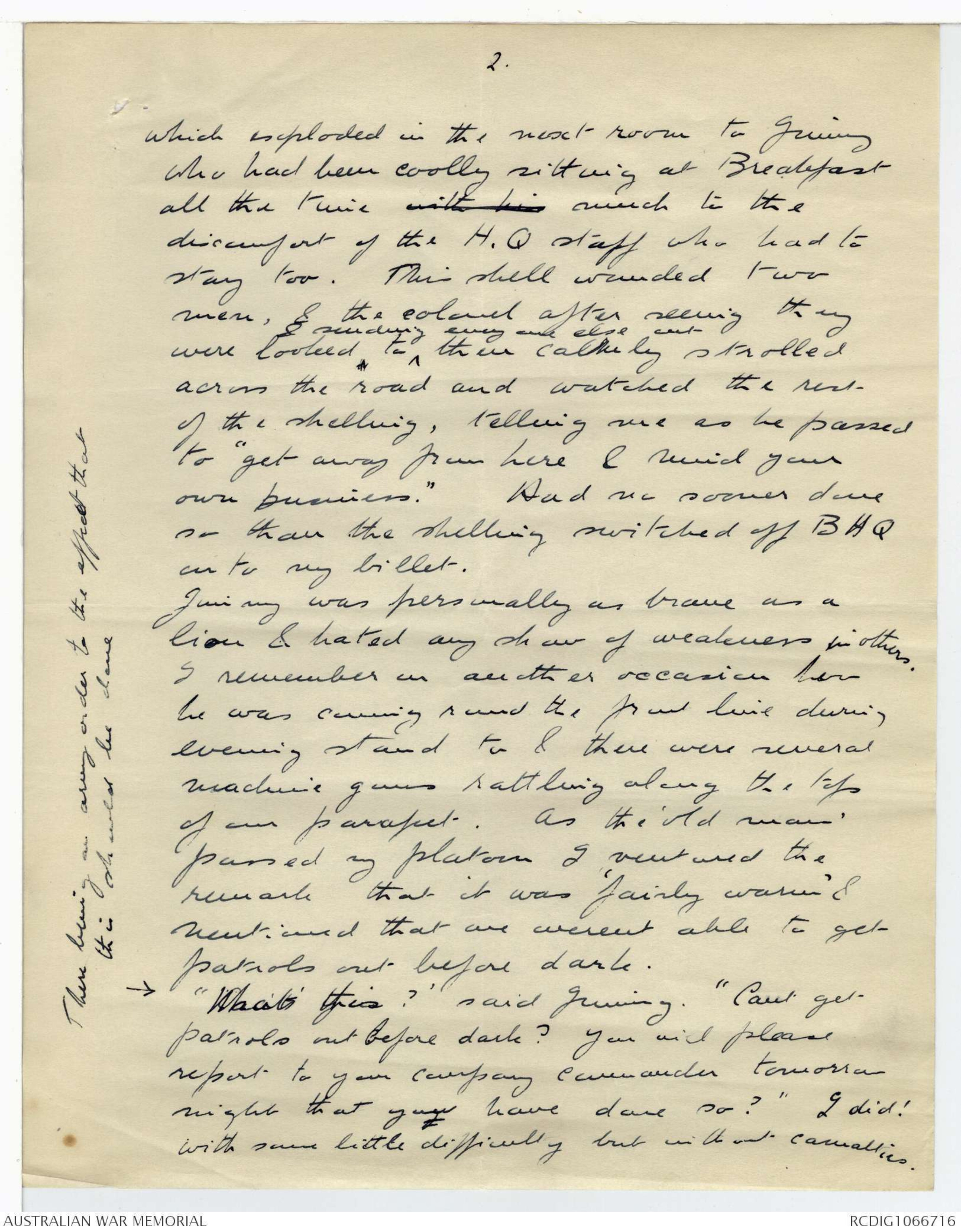
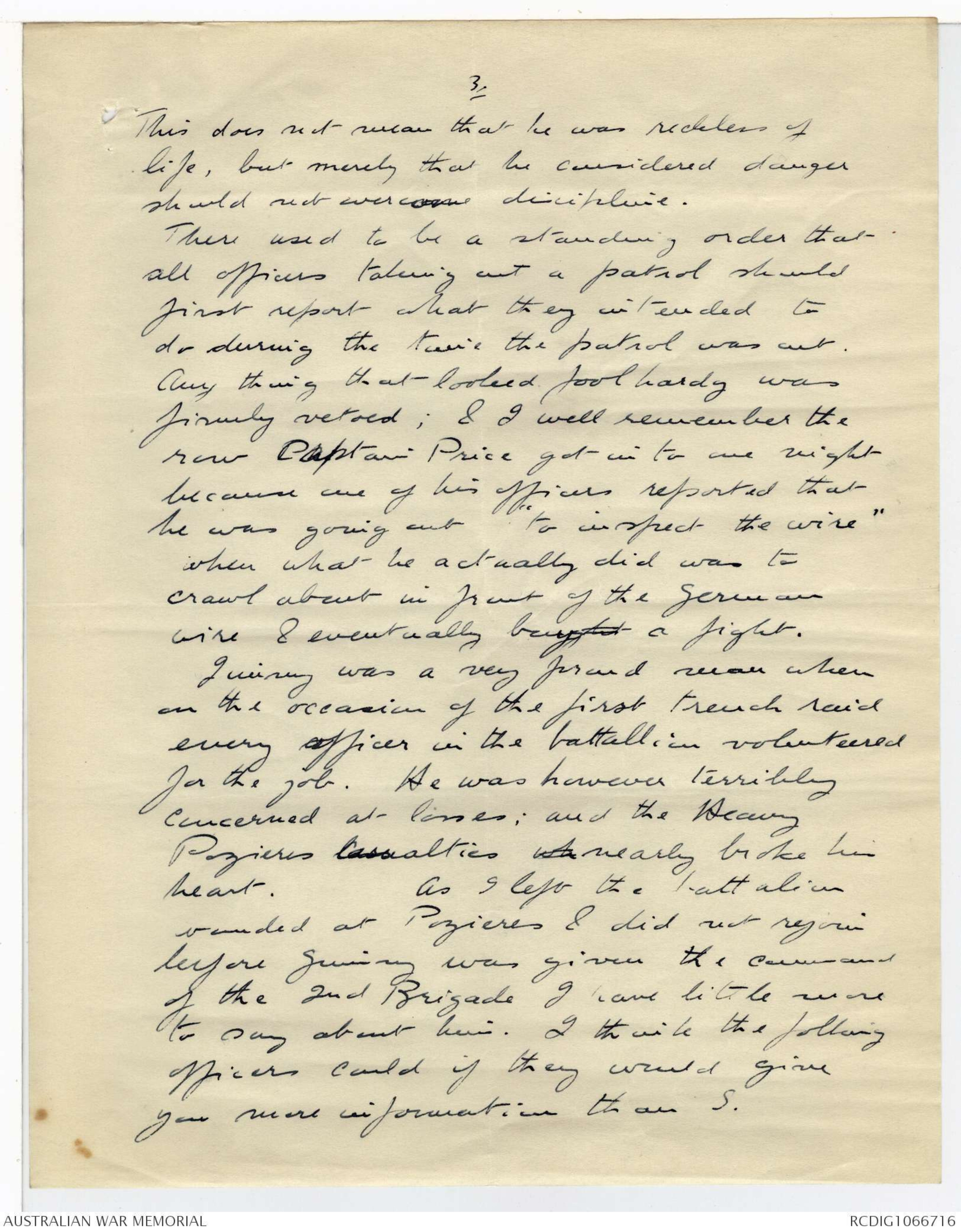
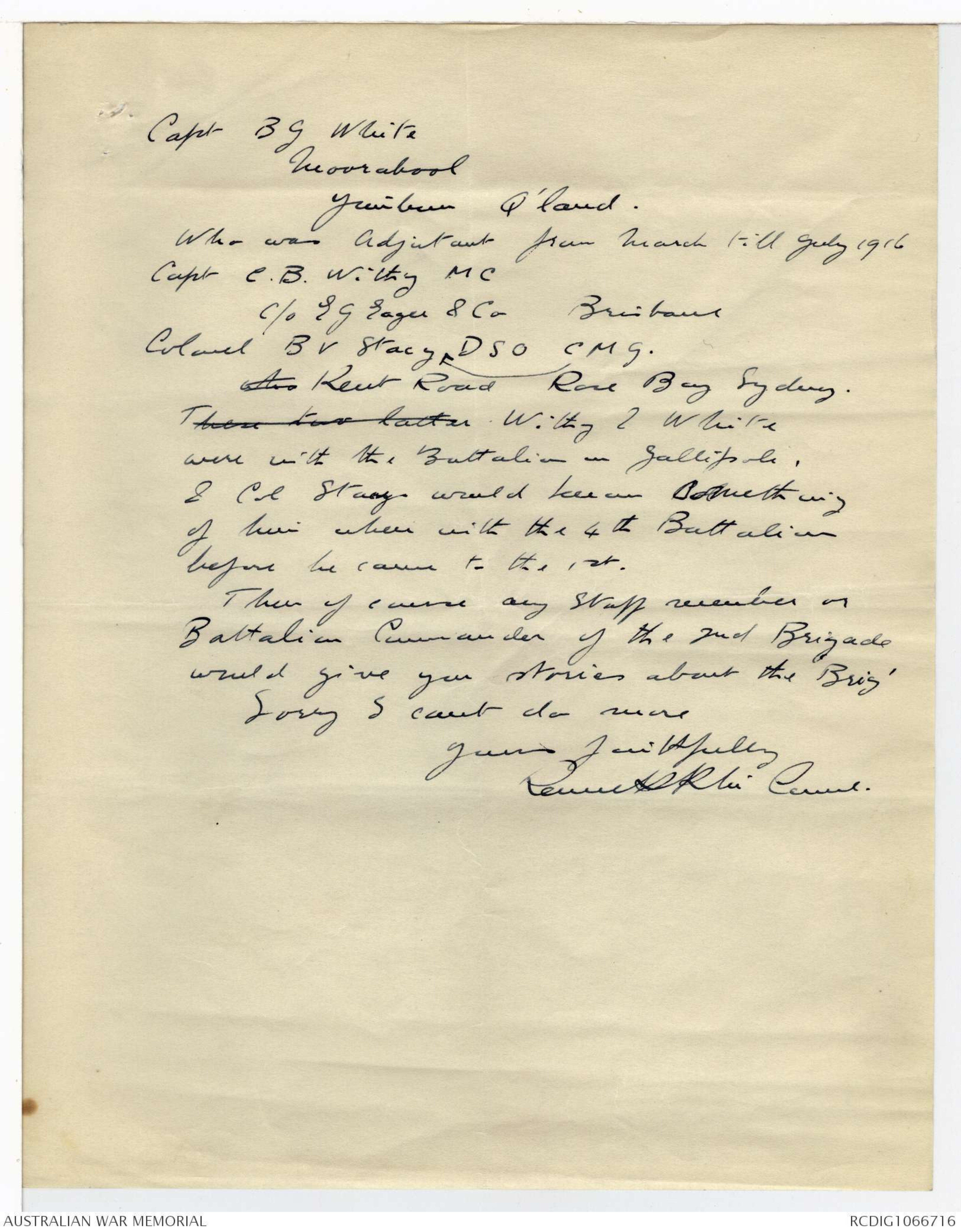
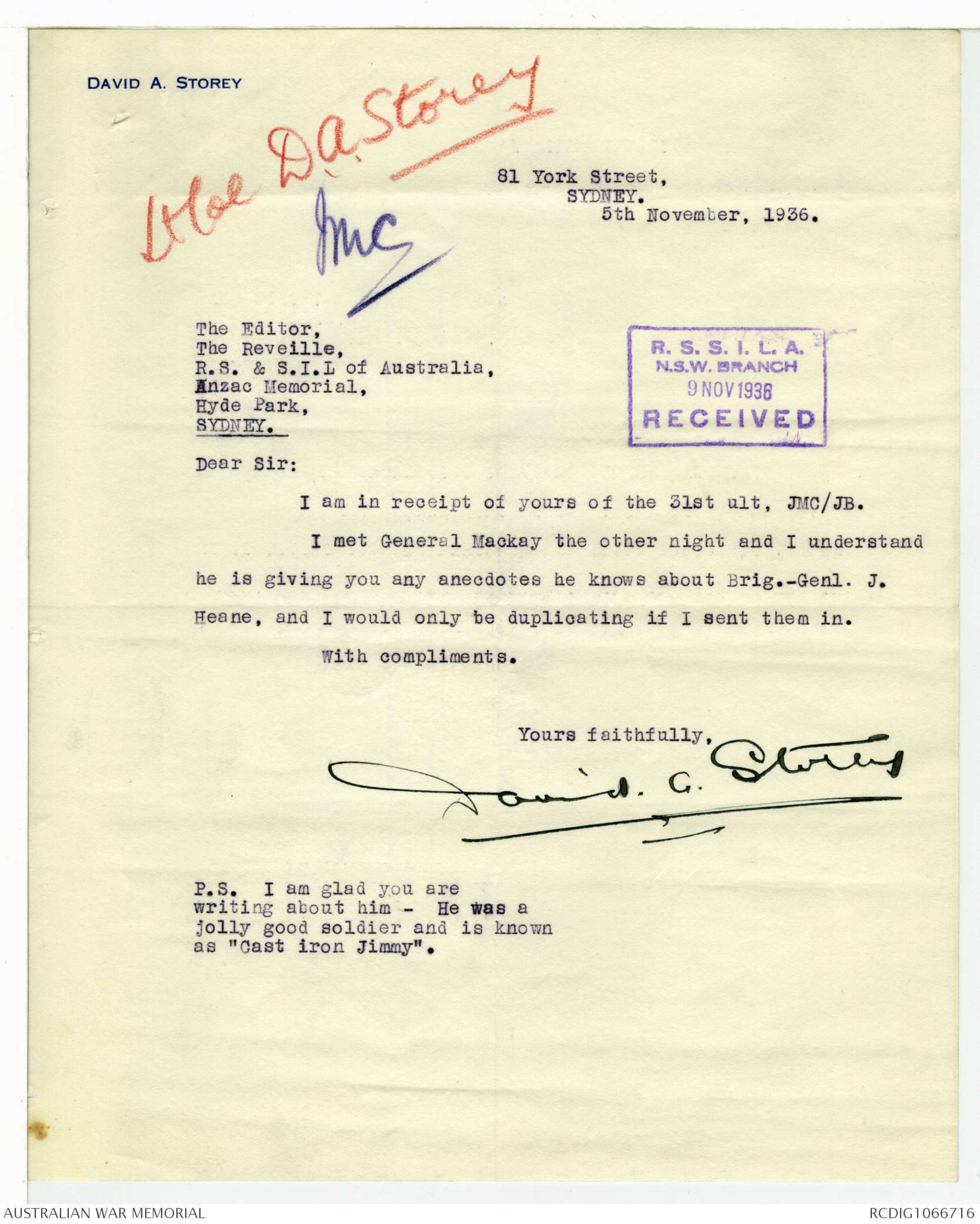
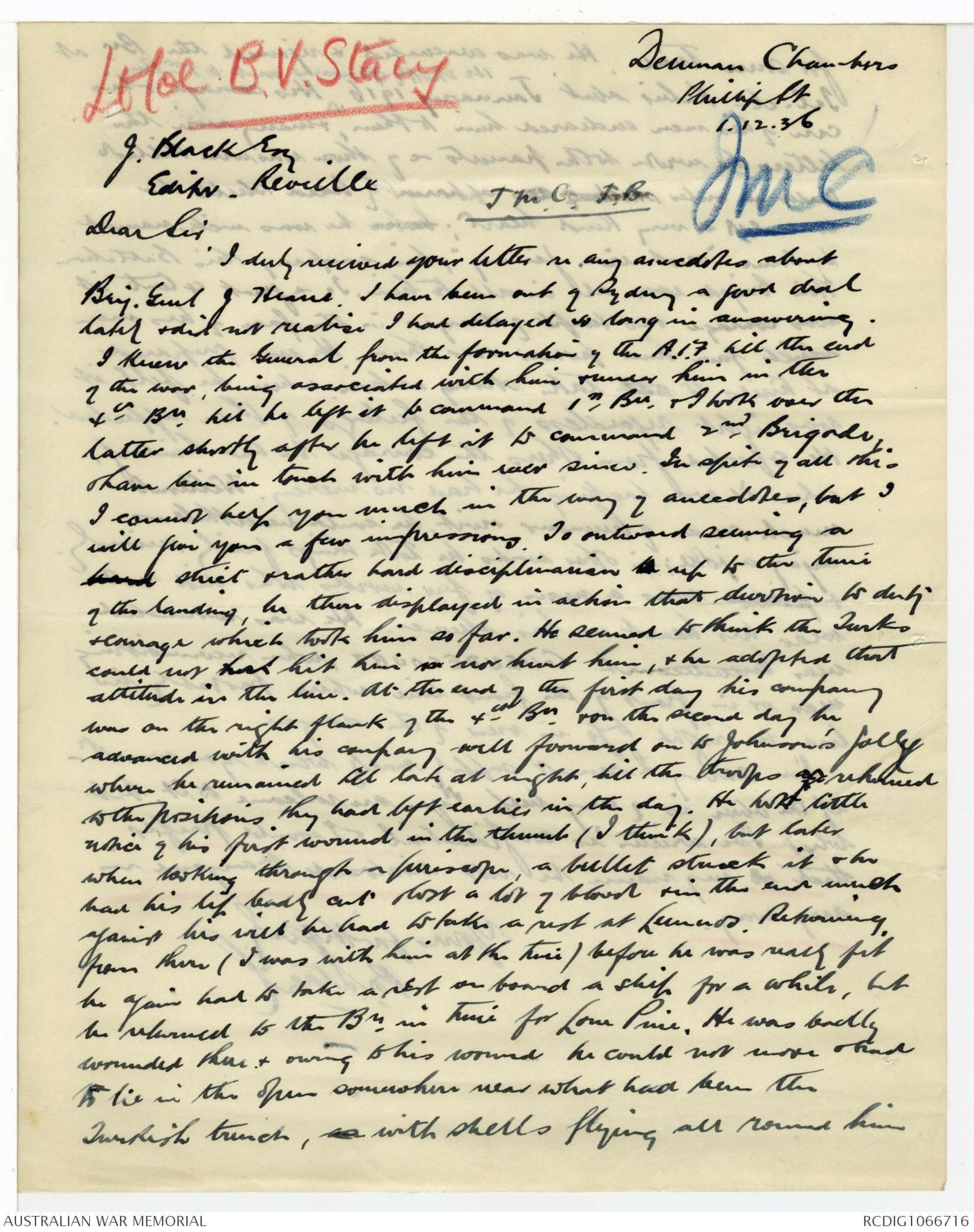
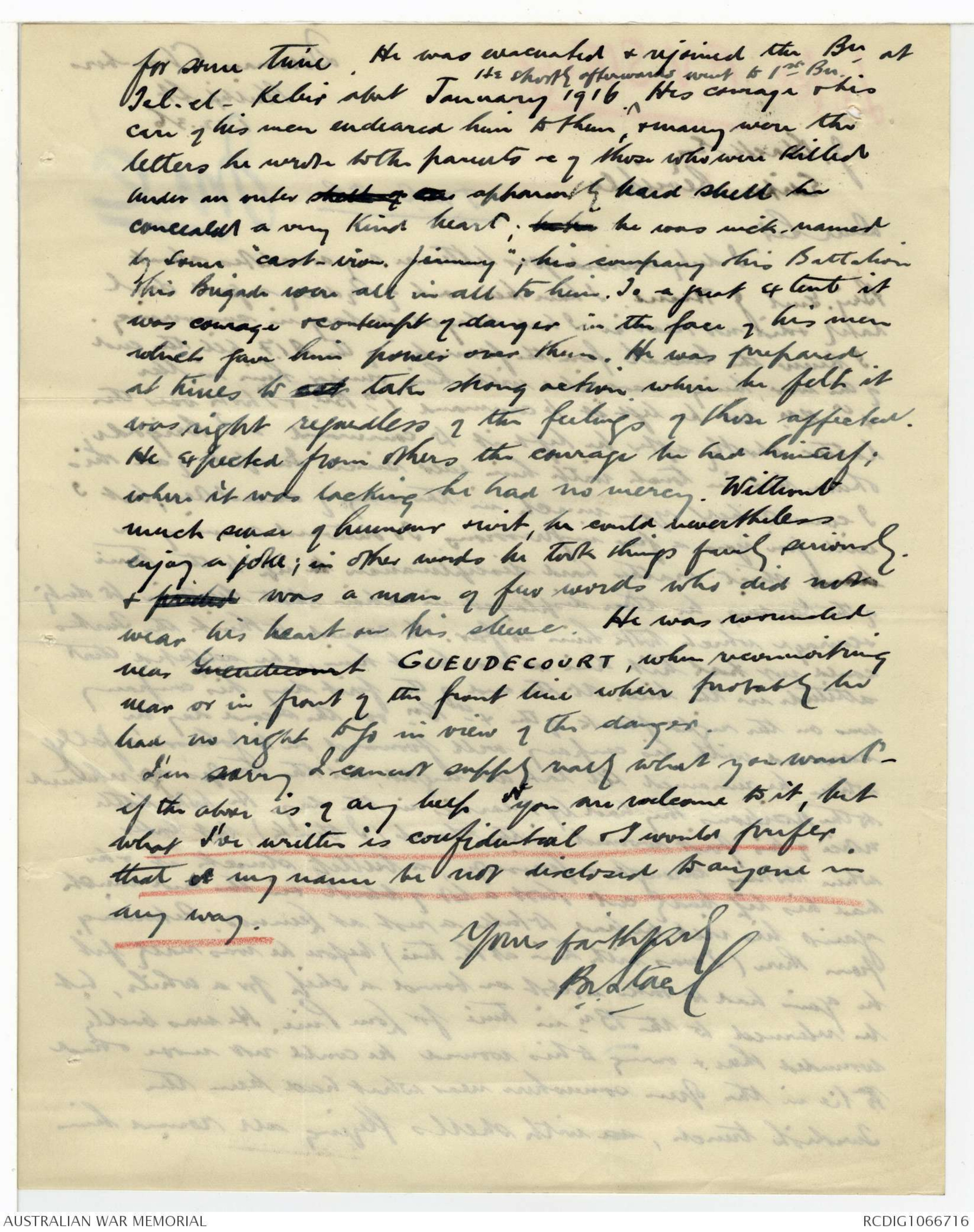
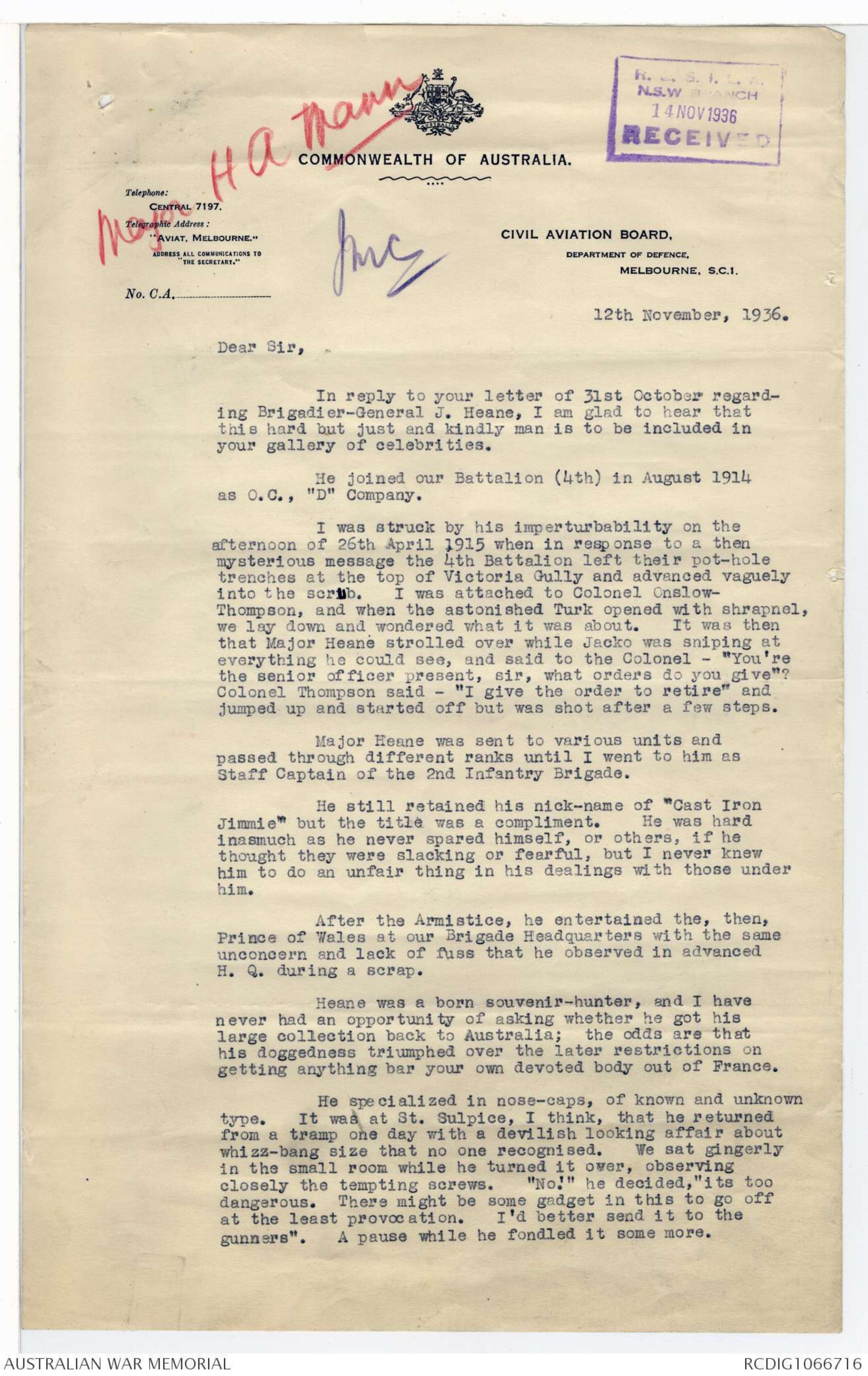
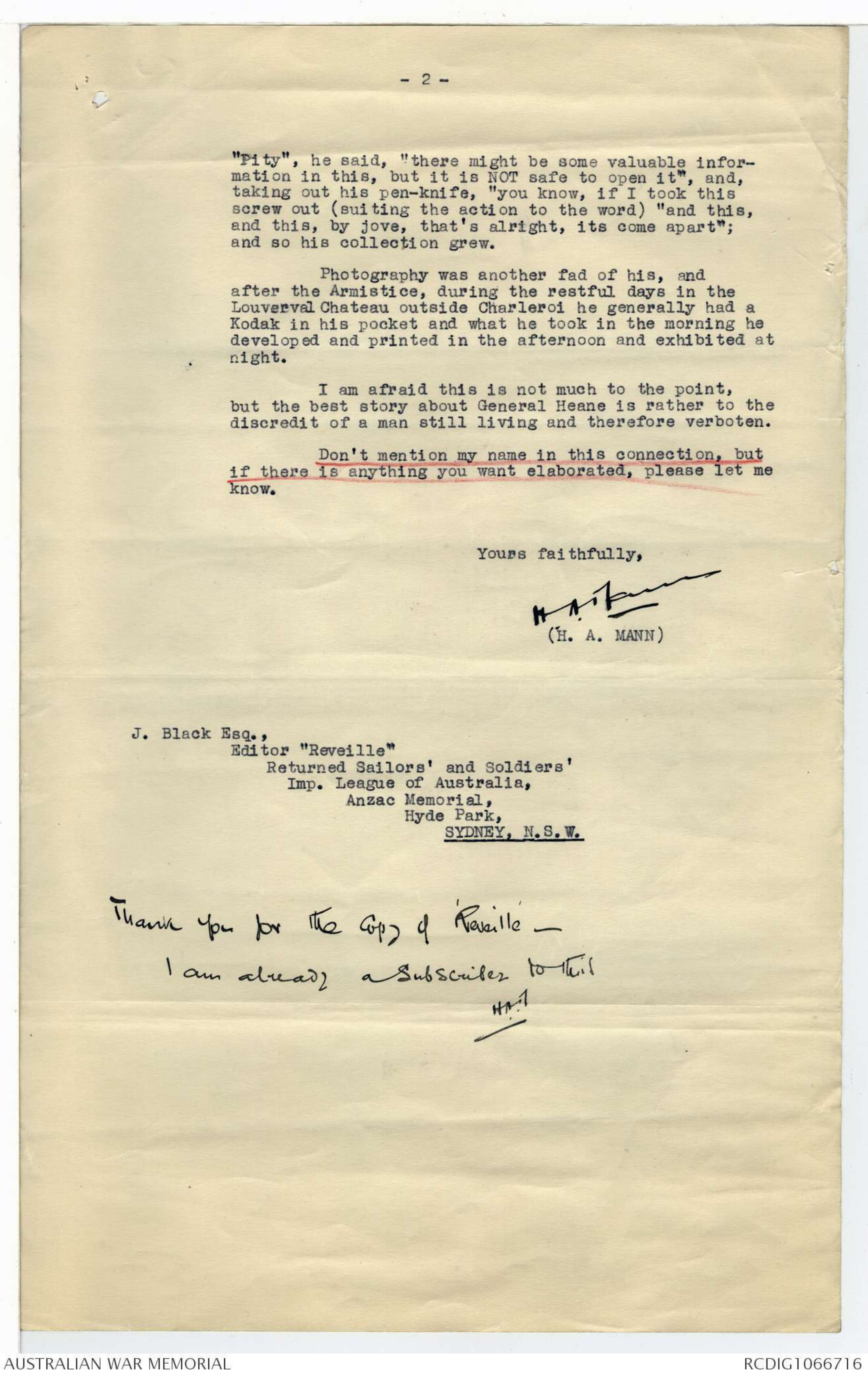
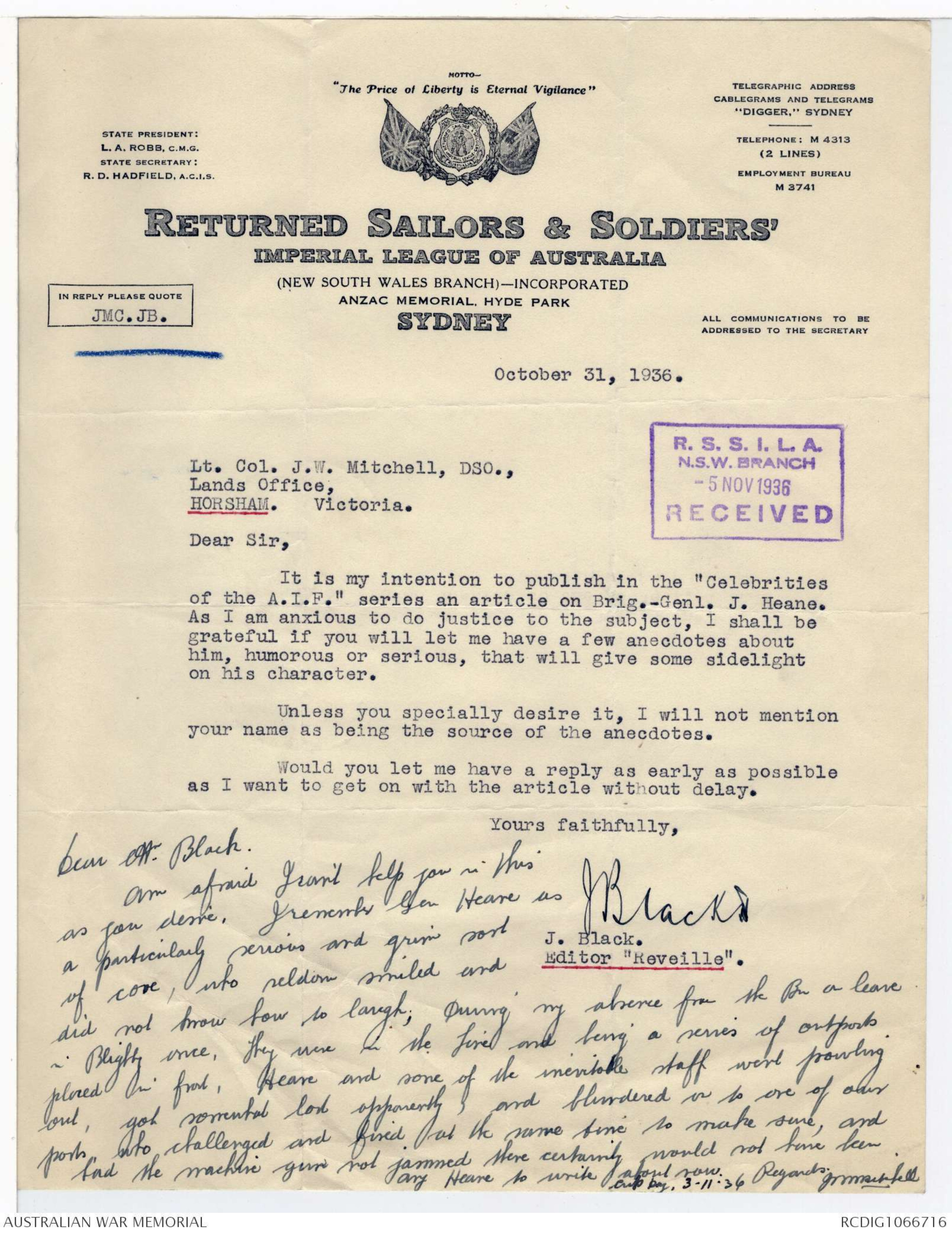
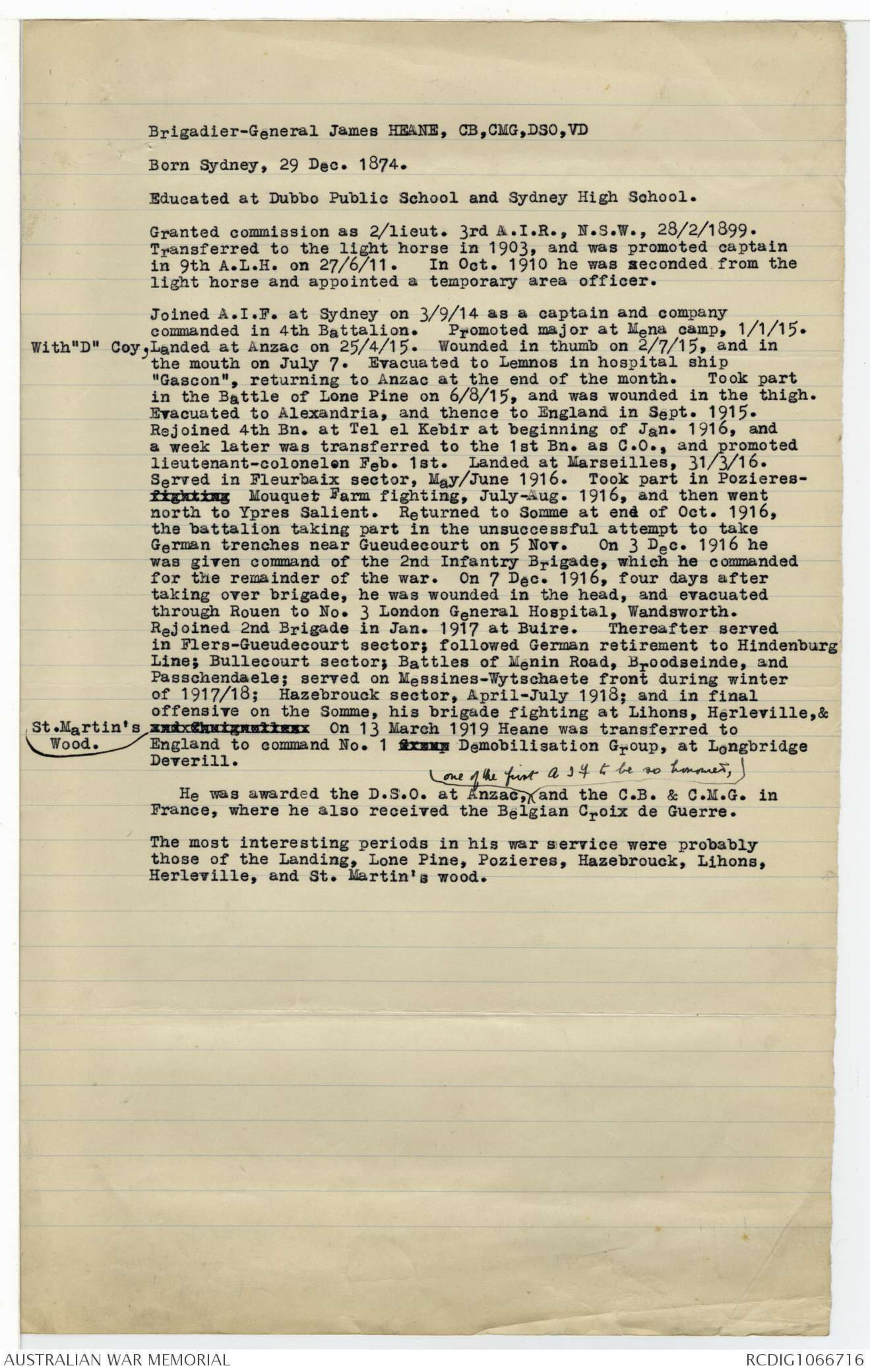
2
which exploded in the next room to Jimmy
who had been coolly sitting at Breakfast
all the time with his much to the
discomfort of the H.Q staff who had to
stay too. This shell wounded two
men, & the colonel after seeing they
were looked to ^ & sending every one else out then casually strolled
across the road and watched the rest
of the shelling, telling me as he passed
to "get away from here & mind your
own business." Had no sooner done
so than the shelling switched off BHQ
onto my billet.
Jimmy was personally as brave as a
lion & hated any show of weakness in others.
I remember on another occasion here
he was coming round the front line during
evening stand to & there were several
machine guns rattling along the tops
of our parapet. As the 'old man'
passed my platoon I ventured the
remark that it was 'fairly warm' &
mentioned that we werent able to get
patrols out before dark.
There being an army order to the effect that
this should be done
(above 2 lines written vertically on left of page)
→"What's this?" said Jimmy. "Cant get-
patrols out before dark? You will please
report to you company commander tomorrow
night that you have done so?" I did!
with some little difficulty but without casualties.
3
This does not mean that he was reckless of
life, but merely that he considered danger
should not overcome discipline.
There used to be a standing order that
all officers taking out a patrol should
first report what they intended to
do during the time the patrol was out.
Anything that looked foolhardy was
firmly vetoed; & I well remember the
row Captain Price got in to one night
because one of his officers reported that
he was going out to "inspect the wire"
when what he actually did was to
crawl about in front of the German
wire & eventually bought a fight.
Jimmy was a very proud man when
on the occasion of the first trench raid
every officer in the battallion volunteered
for the job. He was however terribly
concerned at losses; and the Heavy
Pozieres Casualties nearly broke his
heart. As I left the battalion
wounded at Pozieres & did not rejoin
before Jimmy was given the command
of the 2nd Brigade I have little more
to say about him. I think the following
officers could if they would give
you more information than I.
Capt BG White
Moorabool
[[Yuinbun]] Q'land
Who was Adjutant from March till July 1916
Capt C.B. Withy MC
C/o EG Eager & Co Brisbane
Colonel BV Stacy CMG. DSOwhose Kent Road Rose Bay Sydney.These two latter Withy & White
were with the Battalion in Gallipoli,
& Col Stacy would know something
of him when with the 4th Battalion
before he came to the 1st.
Then of course any Staff member or
Battalion Commander of the 2nd Brigade
would give you stories about the 'Brig'.
Sorry I cant do more
yours faithfully
Kenneth [[R? C?]]
[*Lt Col D.A.Storey
JMC*]
DAVID A. STOREY
81 York Street,
SYDNEY.
5th November, 1936.
The Editor,
The Reveille
R.S. & S.I.L of Australia,
Anzac Memorial,
Hyde Park,
SYDNEY.
[*R.S.S.I.L.A.
N.S.W. BRANCH
9 Nov 1938
RECEIVED*]
Dear Sir:
1 am in receipt of yours of the 3lst ult, JMC/JB.
1 met General Mackay the other night and I understand
he is giving you any anecdotes he knows about Brig.-Genl. J.
Heane, and I would only be duplicating if I sent them in.
With compliments.
Yours faithfully,
David. G. Storey
P.S. 1 am glad you are
writing about him - He was a
jolly good soldier and is known
as "Cast iron Jimmy".
[*Lt Col B.V. Stacy
JMC*]
Denman Chambers
Phillip St
1.12.36
J. Black Esq
Editor, Reveille
J.M.C. J.B.
Dear Sir
I duly received your letter re any anecdotes about
Brig. Genl J Heane. I have been out of Sydney a good deal
lately & did not realise I had delayed so long in answering.
I knew the General from the formation of the A.I.F. till the end
of the war, being associated with him & under him in the
4th Bn till he left it to command 1st Bn. & I took over the
latter shortly after he left it to command 2nd Brigade
& have been in touch with him ever since. In spite all this
I cannot help you much in the way of anecdotes, but I
will give you a few impressions. To outward seeming ahard strict & rather hard disciplinarian to up to the time
of the landing, he then displayed in action that devotion to duty
& courage which took him so far. He seemed to think the Turks
could not hat hit him n nor hurt him, & he adopted that
attitude in the line. At the end of the first day his company
was on the right flank of the 4th Bn & on the second day he
advanced with his company well forward on to Johnson's Jolly
where he remained till late at night, till the troops as returned
to the positions they had left earlier in the day. He took little
notice of his first wound in the thumb (I think), but later
when looking through a periscope, a bullet struck it & he
had his lip badly cut & lost a lot of blood & in the end much
against his will he had to take a rest at Lemnos. Returning
from there (I was with him at the time) before he was really fit
he again had to take a rest on board a ship for a while, but
he returned to the Bn in time for Lone Pine. He was badly
wounded there & owing to his wound he could not move & had
to lie in the open somewhere near what had been the
Turkish trench, as with shells flying all round him
for some time. He was evacuated & rejoined the Bn at
Tel-el-Kebir about January 1916. ^He shortly afterwards went to 1st Bn. His courage & his
care of his men endeared him to them, & many were the
letters he wrote to the parents [[re?]] of those who were killed
Under an outer shell of an apparently hard shell he
concealed a very kind heart; he was nick-named
by some "cast-iron Jimmy"; his company & his Battalion
& his Brigade were all in all to him. To a great extent it
was courage & contempt of danger in the face of his men
which gave him power over them. He was prepared
at times to ask take strong action when he felt it
was right regardless of the feelings of those affected.
He expected from others the courage he had himself;
when it was lacking he had no mercy. Without
much sense of humour & wit, he could nevertheless
enjoy a joke; in other words he took things fairly seriously
& prided was a man of few words who did not
wear his heart on his sleeve. He was wounded
near Guedicourt GUEUDECOURT, when reconnoitring
near or in front of the front line where probably he
had no right to go in view of the danger.
I'm sorry a cannot supply half what you want -
if the above is of any help you are welcome to it, but
what I've written is confidential & I would prefer
that it my name be not disclosed to anyone in
any way.
Yours faithfully
B.V. Stacy
[*Major H A Mann
JMC*]
R.S.S.I.L.A.
[*N.S.W. BRANCH
14 Nov 1936
RECEIVED*]
COMMONWEALTH OF AUSTRALIA.
Telephone
CENTRAL 7187.
Telegraphic Address:
"AVIAT, MELBOURNE"
ADDRESS ALL COMMUNICATIONS TO
"THE SECRETARY"
CIVIL AVIATION BOARD.
DEPARTMENT OF DEFENCE,
MELBOURNE. S.C.I.
No. C.A. .....
12th November, 1936.
Dear Sir,
In reply to your letter of 31st October regarding
Brigadier-General J. Heane, I am glad to hear that
this hard but just and kindly man is to be included in
your gallery of celebrities.
He joined our Battalion (4th) in August 1914
as O.C.. "D"Company.
I was struck by his imperturbability on the
afternoon of 26th April 1915 when in response to a then
mysterious message the 4th Battalion left their pot-hole
trenches at the top of Victoria Gully and advanced vaguely
into the scrub. I was attached to Colonel Onslow-
Thompson, and when the astonished Turk opened with shrapnel,
we lay down and wondered what it was about. It was then
that Major Heane strolled over while Jacko was sniping at
everything he could see, and said to the Colonel - "You're
the senior officer present, sir, what orders do you give"?
Colonel Thompson said - "I give the order to retire" and
jumped up and started off but was shot after a few steps.
Major Heane was sent to various units and
passed through different ranks until I went to him as
Staff Captain of the 2nd Infantry Brigade.
He still retained his nick-name of "Cast Iron
Jimmie" but the title was a compliment. He was hard
inasmuch as he never spared himself, or others, if he
thought they were slacking or fearful, but I never knew
him to do an unfair thing in his dealings with those under
him.
After the Armistice, he entertained the, then,
Prince of Wales at our Brigade Headquarters with the same
unconcern and lack of fuss that he observed in advanced
H.Q. during a scrap.
Heane was a born souvenir-hunter, and I have
never had an opportunity of asking whether he got his
large collection back to Australia; the odds are that
his doggedness triumphed over the later restrictions on
getting anything bar your own devoted body out of France.
He specialized in nose-caps, of known and unknown
type. It was at St. Sulpice, I think, that he returned
from a tramp one day with a devilish looking affair about
whizz-bang size that no one recognised. We sat gingerly
in the small room while he turned it over, observing
closely the tempting screws. "No!" he decided, "its too
dangerous. There might be some gadget in this to go off
at the least provocation. I'd better send it to the
gunners". A pause while he fondled it some more.
2
"Pity", he said, "there might be some valuable information
in this, but it is NOT safe to open it", and,
taking out his pen-knife, "you know, if I took this
screw out (suiting the action to the word) "and this,
and this, by jove, that's alright, its come apart";
and so his collection grew.
Photography was another fad of his, and
after the Armistice, during the restful days in the
Louverval Chateau outside Charleroi he generally had a
Kodak in his pocket and what he took in the morning
developed and printed in the afternoon and exhibited at
night.
I am afraid this is not much to the point,
but the best story about General Heane is rather to the
discredit of a man still living and therefore verboten.
Don’t mention my name in this connection, but
if there is anything you want elaborated, please let me
know.
Yours faithfully,
H.A. Mann
(H.A. MANN)
J. Black Esq.,
Editor "Reveille"
Returned Sailors’ and Soldiers'
Imp. League of Australia,
Anzac Memorial,
Hyde Park,
SYDNEY, N.S.W.
Thank you for the Copy of 'Reveille' -
I am already a Subscriber to this.
H.A.M.
MOTTO
The Price of Liberty is Eternal Vigilance
TELEGRAPHIC ADDRESS
CABLEGRAMS AND TELEGRAMS
"DIGGER," SYDNEY
TELEPHONE: M 4313
(2 LINES)
EMPLOYMENT BUREAU
M 3741
STATE PRESIDENT:
L. A. ROBB, C.M.G.
STATE SECRETARY:
R.D. HADFIELD, A.C.I.S.
RETURNED SALLORS & SOLDIERS
IMPERIAL LEAGUE OF AUSTRALIA
(NEW SOUTH WALES BRANCH)-INCORPORATED
ANZAC MEMORIAL. HYDE PARK
SYDNEY.
ALL COMMUNICATIONS TO BE
ADDRESSED TO THE SECRETARY
IN REPLY PLEASE QUOTE
JMC.JB.
October 31, 1936.
[*R.S.S.l.L.A.
N.S.W. BRANCH
5 NOV 1936
RECEIVED*]
Lt. Col. J.W. Mitchell, DSO.,
Lands Office,
HORSHAM. Victoria.
Dear Sir,
It is my intention to publish in the "Celebrities
of the A.I.F." series an article on Brig.-Genl. J. Heane.
As I am anxious to do justice to the subject, I shall be
grateful if you will let me have a few anecdotes about
him, humorous or serious, that will give some sidelight
on his character.
Unless you specially desire it, I will not mention
your name as being the source of the anecdotes.
Would you let me have a reply as early as possible
as I want to get on with the article without delay.
Yours faithfully,
J Black ed
J. Black
Editor "Reveille"
Dear Offr. Black.
Am afraid I cant help you in this
as you desire. I remember Gen Heane as
a particularly serious and grim sort
of cove, who seldom smiled and
did not know how to laugh; During my absence from the Bn on leave
in Blighty once, they were in the fire and being a series of outposts
placed in front, Heane and some of the inevitable staff went prowling
out, got somewhat lost apparently, and blundered on to one of our
posts, who challenged and fired at the same time to make sure, and
had the machine gun not jammed there certainly would not have been any Heane to write about now.
Regards
Cup Day, 3-11-36
JW Mitchell
Brigadier-General James HEANE, CB, CMG, DSO, VD
Born Sydney, 29 Dec. 1874.
Educated at Dubbo Public School and Sydney High School.
Granted commission as 2/lieut. 3rd A.I.R., N.S.W., 28/2/1899.
Transferred to the light horse in 1903, and was promoted captain
in 9th A.L.H. on 27/6/11. In Oct. 1910 he was seconded from the
light horse and appointed a temporary area officer.
Joined A.I.F. at Sydney on 3/9/14 as a captain and company
commanded in 4th Battalion. Promoted major at Mena camp, 1/1/15.
With "D" Coy, Landed at Anzac on 25/4/15. Wounded in thumb on 2/7/15, and in
the mouth on July 7. Evacuated to Lemnos in hospital ship
"Gascon", returning to Anzac at the end of the month. Took part
in the Battle of Lone Pine on 6/8/15, and was wounded in the thigh.
Evacuated to Alexandria, and thence to England in Sept. 1915.
Rejoined 4th Bn. at Tel el Kebir at beginning of Jan. 1916, and
a week later was transferred to the 1st Bn. as C.O., and promoted
lieutenant-colonel on Feb. 1st. Landed at Marseilles, 31/3/16.
Served in Fleurbaix sector, May/June 1916. Took part in Pozieres-fighting Mouquet Farm fighting, July-Aug. 1916, and then went
north to Ypres Salient. Returned to Somme at end of Oct. 1916,
the battalion taking part in the unsuccessful attempt to take
German trenches near Gueudecourt on 5 Nov. On 3 Dec. 1916 he
was given command of the 2nd Infantry Brigade, which he commanded
for the remainder of the war. On 7 Dec. 1916, four days after
taking over brigade, he was wounded in the head, and evacuated
through Rouen to No. 3 London General Hospital, Wandsworth.
Rejoined 2nd Brigade in Jan. 1917 at Buire. Thereafter served
in Flers-Gueudecourt sector; followed German retirement to Hindenburg
Line; Bullecourt sector; Battles of Menin Road, Broodseinde, and
Passchendaele; served on Massines-Wytschaete front during winter
of 1917/18; Hazebrouck sector, April-July 1918; and in final
offensive on the Somme, his brigade fighting at Lihons, Herleville, &
St.Martin's Wood. xxxxxxx On 13 March 1919 Heane was transferred to
England to command No. 1 Group Demobilisation Group, at Longbridge
Deverill.
He was awarded the D.S.O. at Anzac, ^one of the first A.I.F. to be so honoured, and the C.B. & C.M.G. in
France, where he also received the Belgian Croix de Guerre.
The most interesting periods in his war service were probably
those of the Landing, Lone Pine, Pozieres, Hazebrouck, Lihons,
Herleville, and St. Martin's wood.
 Sandy Mudie
Sandy MudieThis transcription item is now locked to you for editing. To release the lock either Save your changes or Cancel.
This lock will be automatically released after 60 minutes of inactivity.